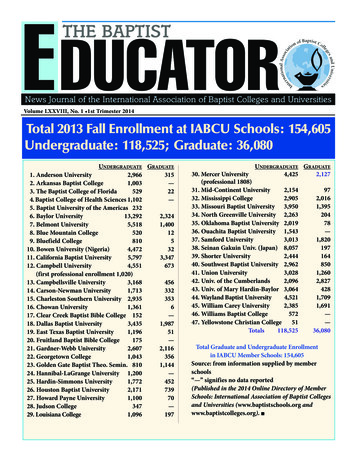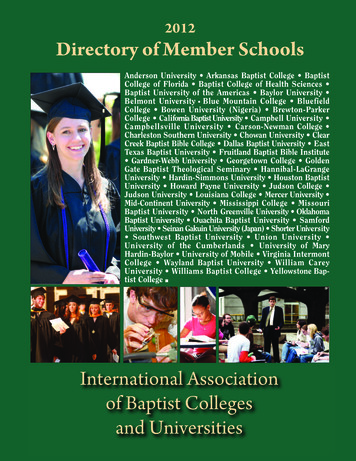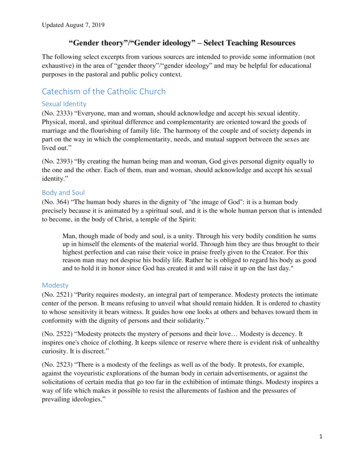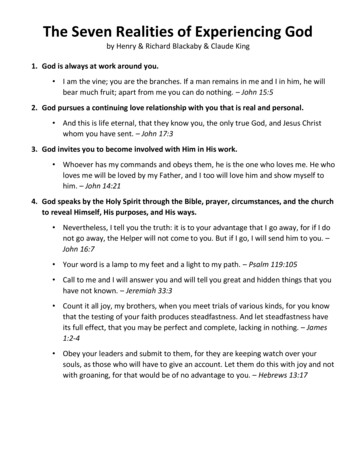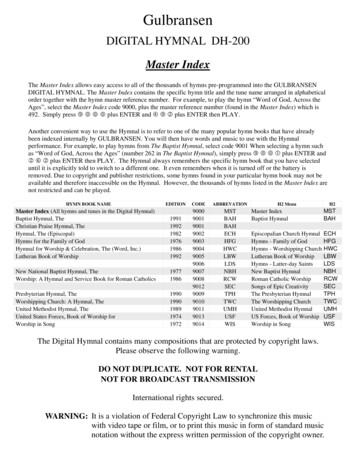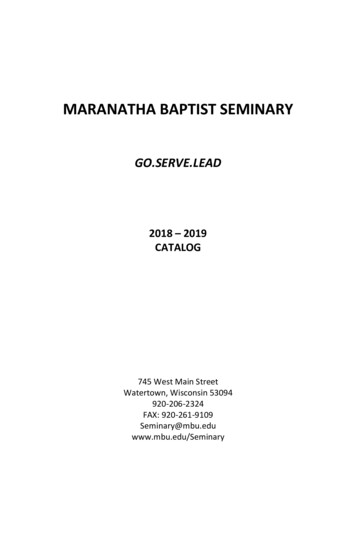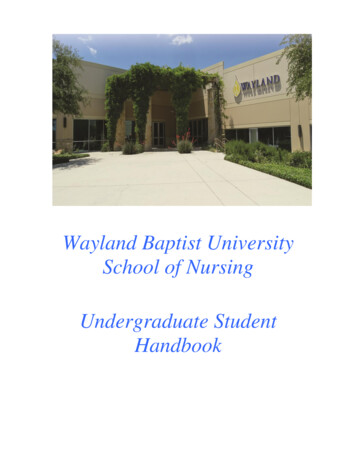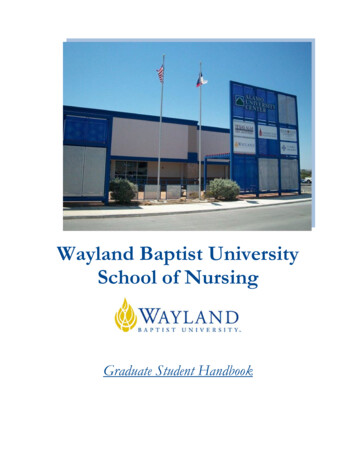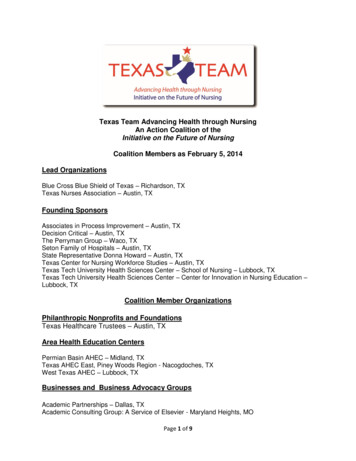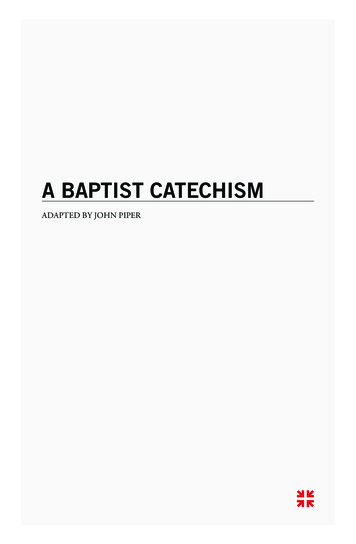
Transcription
A BAPTIST CATECHISMADAPTED BY JOHN PIPER
A CATECHISM?WHAT IS A CATECHISM?In 1 Corinthians 14:19 Paul says, “In the church I would ratherspeak five words with my mind, in order to instruct others, thanten thousand words in a tongue.” In Galatians 6:6 he says, “Let himwho is taught the word share all good things with him who teaches.”Acts 18:25 says that Apollos “has been instructed in the way of theLord.”In each of these verses the Greek word for “instruct” or “teach” iskatecheo. From this word we get our English word “catechize.” Itsimply means to teach biblical truth in an orderly way. Generallythis is done with questions and answers accompanied by biblicalsupport and explanation.WHAT IS THE HISTORY OF THIS CATECHISM?This is a slightly revised version of “The Baptist Catechism” firstput forth by Baptists in 1689 in Great Britain. It was adopted bythe Philadelphia Baptist Association in 1742. It is patterned on thewell-known reformed Westminster Catechism. The few commentsin the earlier questions are meant to help parents make things plainto their children.IS THERE A BIBLICAL PATTERN OF DOCTRINE?Several texts teach that there is. For example, in Romans 6:17 Paulgives thanks that “you have become obedient from the heart to thepattern of teaching to which you were committed.” 2 Timothy 1:13says, “Follow the pattern of sound words which you heard from me.”Acts 2:42 says, “They devoted themselves to the apostles’ teaching.”2 Thessalonians 2:15 says, “Stand firm and hold to the traditions2
which you were taught by us.” And Acts 20:27 says, “I did notshrink from declaring to you the whole counsel of God.”So it appears that there was a body of authoritative instruction andeven a way of teaching it in the early church.WHY IS IT IMPORTANT?1. We are required to “continue in the faith, stable and steadfast”(Col. 1:23).2. We are urged to “attain to the unity of the. knowledge of theSon of God.so that we may no longer be children, tossed toand fro and carried about by every wind of doctrine”(Eph. 4:13-14).3. There are many deceivers (1 John 2:26).4. There are difficult doctrines “which the ignorant and unstabletwist to their own destruction” (2 Peter 3:16).5. Leaders must be raised up who can “give instruction in sounddoctrine and also confute those who contradict it” (Titus 1:9).HOW SHALL WE BEGIN?Make them part of your family routine or just use them foryourself. I am excited about being a partner with you in building a“stable and firm” generation who hopes in God.Learning and teaching with you,Pastor John3
THE CATECHISMSometimes there are other ways to express a true answer to thesequestions. Feel free to use Scripture to formulate other true answerswhere possible and helpful. The aim of a catechism is not to beexhaustive but to give a solid tease from which to “keep growing inthe grace and knowledge of our Lord and Savior Jesus Christ”(2 Peter 3:17).QUESTION 1: WHO IS THE FIRST AND BEST OF BEINGS?Answer: God is the first and best of beings.Scripture: Isaiah 44:6; Psalm 8:1; 96:4; 97:9, 1 Samuel 2:2QUESTION 2: WHAT IS THE CHIEF END OF MAN?Answer: Man’s chief end is to glorify God and to enjoy him forever.Scripture: 1 Corinthians 10:31; Psalm 16:11; 37:4; 73:25-26;Isaiah 43:7.Comment: “Glorify” does not mean make glorious. It means [to]reflect or display as glorious. Other words you could use for “end”are “goal” or “purpose”.QUESTION 3: HOW DO WE KNOW THERE IS A GOD?Answer: The light of nature in man, and the works of God, plainlydeclares that there is a God; but his word and Spirit only, do effectually reveal him unto us for our salvation.Scripture: Romans 1:18-20; Psalm 19:1-2; 2 Timothy 3:15; 1Corinthians 1:21-24; 2:9, 10; Matthew 11:27.Comment: The question distinguishes two kinds of knowledge:one is natural and comes from conscience (“the light of nature in4
man”) and from the works of God in nature; the other is spiritualor saving, and comes from the recognition of the true value of Godand the beauty of his character. Natural knowledge is possessedby all people and thus makes all people accountable to honor andthank God. Spiritual knowledge is possessed only by those whosenatural blindness has been overcome by the Spirit of God. (1 Cor.2:14-16). Our children must come to see the difference betweenthese lest they think they are saved by much natural knowledgeabout God—which the devils also have James 2:19).QUESTION 4: WHAT IS THE WORD OF GOD?Answer: The Scriptures of the Old and New Testaments, beinggiven by divine inspiration, are the Word of God, the only infalliblerule of faith and practice.Scripture: 2 Peter 1:21; 2 Timothy 3:16, 17; Isaiah 8:20; Matthew5:17- 18; 1 Corinthians 2:13; Psalm 19:7-8.Comment: “Scriptures” is a special word for the “writings” of theOT and NT. Perhaps you will want to explain that the OT dealswith God’s word that came before Jesus was born; and the NT isthe word of God that came after Jesus was born. “Infallible” meansit will never lead us astray in what it teaches. It is true and does noterr. It can be trusted. “Faith” refers to right thinking and feeling;and “practice” refers to right doing. We measure our thoughts andemotions and actions by the rule of the Bible. “Inspiration” meansthat it is God-breathed: by his Spirit he guided his spokesmen tospeak his word in their language.QUESTION 5: HOW DO WE KNOW THAT THE BIBLE IS THEWORD OF GOD?Answer: The Bible evidences itself to be God’s Word by the5
heavenliness of its doctrine, the unity of its parts, and its powerto convert sinners and to edify saints. But only the Spirit of Godcan make us willing to agree and submit to the Bible as the Wordof God.Scripture: 1 Corinthians 2:6-7,13-16; Psalm 19:7-9; 119:18,129;Acts 10:43; 26:22; 18:28; Hebrews 4:12; Romans 15:4;John 16:13,14; 1 John 2:20-27; 2 Corinthians 3:14-17; 4:4, 6.Comment: “Heavenliness” refers to the fact [that] the teachingsof Scripture are of such a nature that they cannot be explained bymere human resources. They bear the marks of the supernatural.“No man ever spoke like this man” (John 7:46). The “unity ofits parts” has to do especially with the way all Scripture points toChrist. “To him all the prophets bear witness” (Acts 10:43). Thereare detailed and scholarly historical arguments for the reliabilityof the Bible, but these are generally beyond the acquaintance ofordinary Christians, and so do not serve as widespread support forScripture. They are needed, however, in the scholarly arena. [See “Isthe Bible a Reliable Guide to Lasting Joy” in Desiring God by JohnPiper (Multnomah Press, 1986).]QUESTION 6: MAY ALL MEN MAKE USE OF THE SCRIPTURES?Answer: All men are not only permitted, but commanded andexhorted, to read, hear, and understand the Scriptures.Scripture: John 5:39; Luke 16:29; Acts 8:28-30; 17:11.QUESTION 7: WHAT DO THE SCRIPTURES MAINLY TEACH?Answer: The Scriptures mainly teach what man is to believe aboutGod and what duty God requires of man.Scripture: 2 Timothy 3:16, 17; John 20:31; Acts 24:14; 1 Corinthians 10:11; Ecclesiastes 12:13.6
QUESTION 8: WHAT IS GOD?Answer: God is a Spirit, infinite, eternal, and unchangeable, in hisbeing, wisdom, power, holiness, justice, goodness, and truth.Scripture: John 4:24; Psalm 89:14; 90:2; 147:5; James 1:17; Revelation 4:8; Exodus 34:6, 7; 1 Timothy 1:17; Numbers 23:19.Comment: Ask what “infinite” means (there is no limit to how greathe is!). What does “eternal” mean? (He never had a beginning and willnever have an ending!) Talk about how God can respond to us and yetnot be “changeable.” (His character never changes; he acts consistentlyon the same principles always. Even his responses to us are known andplanned long before so that his purposes are unchanging.)QUESTION 9: ARE THERE MORE GODS THAN ONE?Answer: There is only one living and true God.Scripture: Deuteronomy 6:4; Jeremiah 10:10; Psalm 96:4-5.Comment: There are “gods” which are idols, but they are not “living”. And there are “gods” which are angels or demons, but they arenot “true” God, that is they are not eternal, infinite and unchanging. Only one God is living and true.QUESTION 10: HOW MANY PERSONS ARE THERE INTHE GODHEAD?Answer: There are three persons in the Godhead: the Father, theSon, and the Holy Spirit; and these three are one God, the same inessence, equal in power and glory.Scripture: 1 Corinthians 2:11; 8:6; John 1:1; 10:30; 14:9; 20:28;Acts 5:3,4; Matthew 28:19; 2 Corinthians 13:14; Colossians 2:9;Hebrews 1:3.7
Comment: The word “Godhead” is needed because we shouldn’tsay that there are three persons in God. No, there are three personswho are God. Nor should we say that there are three Gods. Thereis one God. They are distinct persons with special roles in creationand redemption. But they are in perfect harmony and are (in waysbeyond our comprehension) perfectly One God. (See The Pleasuresof God, by John Piper, Multnomah Press, pp. 38, 42-44 for oneexplanation of the Trinity.)QUESTION 11: WHAT ARE THE DECREES OF GOD?Answer: The decrees of God are his eternal purpose, according tothe counsel of his will, whereby for his own glory, he has foreordained whatsoever comes to pass.Scripture: Ephesians 1:11; Romans 11:36; Daniel 4:35; Isaiah46:10; Psalm 115:3; Amos 3:6.Comment: You might shorten it to: “God’s decrees are his ownplans for history. And they always happen.” His purpose for theworld is eternal because there never was a time when he didn’t knowwhat he was going to do. His purpose accords with the counsel ofhis will--that is he did not consult anyone else. He thought it allup. All plans were made in order to maximize the display of hisglory. Nothing falls outside the decrees of God.QUESTION 12: HOW DOES GOD EXECUTE HIS DECREES?Answer: God executes his decrees in the works of creation andprovidence.Scripture: Genesis 1:1; Revelation 4:11; Matthew 5:45; 6:26; Acts14:17: Proverbs 16:9, 33; 19:21; 20:24; 21:1, 31.Comment: Instead of “execute” you can say “perform” or “accomplish” or “bring about”. The word “providence” will be taken up8
in a later question. For now it refers to the way God preserves andgoverns all his creatures and all their actions (like the fall of a birdor the election of a president). It refers to God’s general rule overthe world he has created.QUESTION 13: WHAT IS THE WORK OF CREATION?Answer: The work of creation is God’s making all things [out] ofnothing, by the word of his power and all very good.Scripture: Genesis 1:1, 31; Hebrews 11:3; Exodus 20:11;Romans 4:17.Comment: Before creation there was only God in the holy fellowship of the Trinity. Therefore his creation is always different fromours: we start with something.QUESTION 14: HOW DID GOD CREATE MAN?Answer: God created man male and female, after his own image,in knowledge, righteousness, and holiness, with dominion over thecreatures.Scripture: Genesis 1:27-28; Colossians 3:10; Ephesians 4:24.Comment: In saying that we were created after his image “inknowledge, righteousness and holiness,” we do not mean we knowall God knows, nor that we are a fountain of righteousness andholiness the way he is. We mean that we were capable of sharing hisknowledge and righteousness and holiness in a relationship of trustand love unlike any other creature under the angels.QUESTION 15: WHAT ARE GOD’S WORKS OF PROVIDENCE?Answer: God’s works of providence are the holy, wise, and powerful actswhich he preserves and governs all his creatures, and all their actions.9
Scripture: Nehemiah 9:6; Colossians 1:17; Hebrews 1:3; Psalm103:19; Matthew 10:29-30.Comment: It would be helpful to discuss this with your child inrelation to the common concept of “luck.” Is there such a thing asluck in a world ruled by the providence of God? “The lot is castinto the lap, but the decision is wholly from the Lord” (16:33). Youwill also need to stress that many of God’s acts of providence maynot look “holy and wise” (like storms that kill thousands of people).But then stress that God has his secret purposes (Deut. 29:29) thatwe are never great enough to see, and the Judge of all the earthalways does right (Genesis 18:25).QUESTION 16: WHAT SPECIAL ACT OF PROVIDENCE DID GOD EXERCISETOWARDS MAN WHEN HE WAS FIRST CREATED?Answer: When God had created man, he made a covenant withhim that he should live and enjoy all the benefits of creation, butthat he would die if he forsook the obedience that comes fromfaith. God commanded him not to eat of the tree of the knowledgeof good and evil, and thus forsake his child-like dependence uponGod for all things.Scripture: Genesis 2:15-17; Galatians 3:12; Romans 5:12.Comment: The “knowledge of good and evil” is the ability to judgeindependently what is beneficial (good) and harmful (evil) foryourself. What God is forbidding is that man should choose to beindependent from God in his evaluation of things. He is commanding man to walk by faith in the wise and loving care of his heavenlyFather. (See the use of this phrase in Gen. 3:5, 22; 2 Sam. 14:17; Is.7:15; 2 Sam 19:35.)QUESTION 17: DID OUR FIRST PARENTS CONTINUE IN THE GLAD10
OBEDIENCE FOR WHICH THEY WERE CREATED?Answer: No, but desiring to be like God, our first parents forsookthe obedience of faith, ate of the forbidden tree, sinned againstGod, and fell from the innocence in which they were created.Scripture: Genesis 3:1-7; Ecclesiastes 7:29; Romans 5:12.QUESTION 18: WHAT IS SIN?Answer: Sin is transgression of the revealed will of God whichteaches that we are to act in perfect holiness from a heart of faith tothe glory of God.Scripture: 1 John 3:4; Romans 5:13; 14:23; 1 Peter 1:16; Matthew5:48; 1 Corinthians 10:31.Comment Simplified: Sin is any attitude or desire or action thatexplicitly breaks a commandment of Scripture, or comes from aheart of unbelief or is not done for the glory of God.QUESTION 19: WHAT WAS THE SIN WHEREBY OUR FIRST PARENTS FELLFROM THE ESTATE WHEREIN THEY WERE CREATED?Answer: The sin whereby our first parents fell from the estatewherein they were created, was their eating the forbidden fruitScripture: Genesis 3:6, 12, 13.QUESTION 20: DID ALL MANKIND FALL IN ADAM’S FIRST SIN?Answer: All mankind, descending from Adam by ordinary generation, sinned in him, and fell with him in his first sin.Scripture: 1 Corinthians 15:21-22; Romans 5:12, 18-19.Comment: God considered all mankind as being in Adam so thatwhen Adam went bad we all went bad in him. The nature that we11
have by virtue of belonging to Adam’s race is morally corrupt. Weare under the wrath of God “by nature” (Ephesians 2:3) from thetime we were conceived in the womb. This is why conversion andsalvation must be much more than a “decision” for Christ. It mustbe a new creation, a rebirth, an exchange of hearts.QUESTION 21: INTO WHAT CONDITION DID THE FALL BRING MANKIND?Answer: The fall brought mankind into a condition of sin and misery.Scripture: Psalm 51:5; Romans 5:18-19; 7:18; Isaiah 53:6; 64:6;John 3:6-7; Ephesians 2:1-3; 1 Corinthians 2:14.QUESTION 22: WHAT IS THE SINFULNESS OF THAT CONDITION INTOWHICH ALL MANKIND HAS FALLEN?Answer: The sinfulness of the condition into which all mankindfell is the guilt of Adam’s first sin, the lack of original righteousness,and the corruption of our whole nature (which is commonly calledoriginal sin), together with all actual transgressions which comefrom this nature.Scripture: Romans 5:19; 3:10; Ephesians 2:1; Isaiah 53:6; Psalm51:5; Matthew 15:19.Comment: The Bible says that “in Adam all die” (1 Cor. 15:22)and that “one transgression yields condemnation for all men”(Rom. 5:18) and that “one man’s disobedience made many sinners”(Rom. 5:19). These statements lead us to conclude that God, in away beyond our comprehension, established a unity between Adamand his posterity which makes it just for us to receive the imputation of his guilt and corruption. He was in some sense our representative head. We sinned in him and fell with him.QUESTION 23: WHAT IS THE MISERY INTO WHICH ALL MANKIND FELL12
THROUGH ADAM’S FIRST SIN?Answer: All mankind, by their fall, lost communion with God, areunder his wrath and curse, and so made liable to all the miseries ofthis life, to death itself, and to the pains of hell forever.Scripture: Genesis 3:8, 24; Ephesians 2:3; Galatians 3:10; Romans6:23; Matthew 25:41-46; Psalm 9:17.Comment: Keep in mind that “liable to” means that these miseries will indeed befall all people unless a special work of God’s graceintervenes.QUESTION 24: DID GOD LEAVE ALL MANKIND TO PERISH IN THECONDITION OF SIN AND MISERY?Answer: God, out of his mere good pleasure, from all eternity, having chosen a people to everlasting life, did enter into a covenant ofgrace, to deliver them out of the condition of sin and misery, and tobring them into a condition of salvation, by a Redeemer.Scripture: Ephesians 1:3-4; 2 Thessalonians 2:13; Romans 5:21;8:29-30; 9:11-12; 11:5-7; Acts 13:48; Jeremiah 31:33.Comment: The term “covenant of grace” is filled with sweet andprecious hope. It refers to the free decision, commitment and oathof God to employ all his omnipotence and wisdom and love to rescue and glorify his people from sin and misery. It is wholly initiatedand carried through by God. It cannot fail.It is valid for all who believe. Whosoever will may come andenjoy this grace! And, since this “believing” and this “willing” is awork of God’s sovereign grace, those who believe and come are theelect, “chosen in Christ before the foundation of the world” (Eph.1:4). Thus the covenant was sealed in the heart of God before theworld was.13
This “covenant of grace” is the cry of victory over all the battle strifein missions. The grace of God will triumph! He is covenantbound, oath-bound to save all those who are foreordained to eternallife (Acts 13:48)! “Jesus died for the nation (of Jews), and not forthe nation only, but to gather into one the children of God who arescattered abroad” (John 11:52).The battle cry of missions is, “The Lord has other sheep that are notof this fold: He must (covenant-bound!!) bring them also. Theywill (sovereign grace!!) heed his voice!” John 10:16.QUESTION 25: WHO IS THE REDEEMER OF GOD’S ELECT?Answer: The only Redeemer of God’s elect is the Lord Jesus Christ,who, being the eternal Son of God, became man, and so was andcontinues to be God and man, in two distinct natures and oneperson, forever.Scripture: Galatians 3:13; 1 Timothy 2:5; 3:16; John 1:14; Romans 9:5; Colossians 2:9.QUESTION 26: HOW DID CHRIST, BEING THE SON OF GOD, BECOME MAN?Answer: Christ, the Son of God became man by taking to himselfa true body and a reasonable soul. He was conceived by the powerof the Holy Spirit in the womb of the Virgin Mary, and was born ofher, yet without sin.Scripture: Hebrews 2:14; 4:14; 7:26; Matthew 26:38; Luke 2:52;John 1:14; 12:27; Luke 1:31, 35; 2:52; Colossians 2:9.Comment: I am typing this on a Personal Computer. I have virtually no idea how it works. That it works I am certain: I have typedhundreds of sermons on it. So it is with the “incarnation”--the“how” is (as the old theologians used to say) “ineffable”. We believeit because the Scriptures teach it and because it “works” to make14
sense out of God’s whole redemptive plan.QUESTION 27: WHAT OFFICES DOES CHRIST PERFORM ASOUR REDEEMER?Answer: Christ, as our Redeemer, performs the offices of a prophet,of a priest, and of a king, both in his condition of humiliation andexaltation.Scripture: Acts 3:22; Hebrews 5:6; Psalm 2:6.QUESTION 28: HOW DOES CHRIST PERFORM THE OFFICE OF A PROPHET?Answer: Christ performs the office of a prophet, in revealing to us,by his Word and Spirit, the will of God for our salvation.Scripture: John 1:18; 14:26; 15:15.QUESTION 29: HOW DOES CHRIST PERFORM THE OFFICE OF A PRIEST?Answer: Christ performs the office of a priest by once offering himself as a sacrifice to satisfy divine justice, and to reconcile us to God;and by making continual intercession for us before God.Scripture: 1 Peter 2:24; Hebrews 2: 17; 7:25; 9:28; Ephesians 5:2;Romans 8:34.QUESTION 30: HOW DOES CHRIST PERFORM THE OFFICE OF A KING?Answer: Christ performs the office of a king, in subduing us tohimself, in ruling and defending us, and in restraining and conquering all his and our enemies.Scripture: Psalm 110:1-2; Matthew 2:6; Luke 1:32-33;1 Corinthians 15:25.15
QUESTION 31: WHAT DO WE MEAN BY CHRIST’S HUMILIATION?Answer: By Christ’s humiliation we mean that he was born, andthat in a low condition; that he was made under the law, and underwent the miseries of this life, the wrath of God, and the curseddeath of the cross; that he was buried, and continued under thepower of death for a time.Scripture: Luke 2:7; Galatians 4:4; Isaiah 53:3; Luke 22:44; Matthew 12:40; 27:46; Philippians 2:8; Mark 15:45-6.QUESTION 32: WHAT DO WE MEAN BY CHRIST’S EXALTATION?Answer: By Christ’s exaltation we mean his rising again from thedead on the third day, ascending up into heaven, sitting at the righthand of God the Father, and coming to judge the world at the last day.Scripture: 1 Corinthians 15:4; Acts 1:11; Mark 16:19; Acts 17:31.QUESTION 33: HOW ARE WE MADE PARTAKERS OF THE REDEMPTIONPURCHASED BY CHRIST?Answer: We are made partakers of the redemption purchased byChrist, by the effective application of it to us, by his Holy Spirit.Scripture: John 3:5, 6; Titus 3:5, 6.QUESTION 34: HOW DOES THE SPIRIT APPLY TO US THE REDEMPTIONPURCHASED BY CHRIST?Answer: The Spirit applies to us the redemption purchased byChrist, by working faith in us, and thereby uniting us to Christ inour effectual calling.Scripture: 1 John 5:1; Philippians 1:29; Ephesians 2:8; Acts 16:14;18:27; John 3:8; 6:64f.16
QUESTION 35: WHAT IS EFFECTUAL CALLING?Answer: Effectual calling is the work of God’s Spirit, to convinceus of our sin and misery, to enlighten our minds in the knowledgeof Christ, to renew our wills, and thus persuade and enable us toembrace Jesus Christ, freely offered to us in the gospel.Scripture: 2 Timothy 1:9; John 6:44, 45; 16:8-11; Acts 2:37;26:18; Ezekiel 36:26; Romans 8:30; 1 Corinthians 1:24; 12:3.QUESTION 36: WHAT BENEFITS DO THOSE WHO ARE EFFECTUALLY CALLEDRECEIVE IN THIS LIFE?Answer: Those who are effectually called receive in this life justification, adoption, sanctification, and the several benefits which in thislife accompany or flow from them.Scripture: Romans 8:30-32; Galatians 3:26; 1 Corinthians 1:30;6:11; Ephesians 1:5.Comment: We must distinguish effectual calling from the generalcall of the gospel. Not all who hear the gospel believe. But all whoare effectually called by God do believe. The call creates what itcommands.QUESTION 37: WHAT IS JUSTIFICATION?Answer: Justification is an act of God’s free grace, by which hepardons all our sins, and accepts us as righteous in his sight, onlyfor the righteousness of Christ imputed to us, and received byfaith alone.Scripture: Romans 3:24; 5:19; Ephesians 1:7; 2 Corinthians 5:21;Philippians 3:9; Galatians 2:16.QUESTION 38: WHAT IS ADOPTION?17
Answer: Adoption is an act of God’s free grace, by which we arereceived into the company of God’s children and have a right to allthe privileges of his sons.Scripture: 1 John 3:1; John 1:12; Romans 8:16, 17.QUESTION 39: WHAT IS SANCTIFICATION?Answer: Sanctification is the work of God’s free grace by which weare renewed in the whole person after the image of God, and areenabled more and more to die unto sin, and live unto righteousness.Scripture: 2 Thessalonians 2:13; Ephesians 4:23, 24; Romans 6:11.QUESTION 40: WHAT ARE THE BENEFITS WHICH IN THIS LIFE DO ACCOMPANY OR FLOW FROM JUSTIFICATION, ADOPTION, AND SANCTIFICATION?Answer: The benefits which in this life do accompany or flow fromjustification, adoption, and sanctification, are, assurance of God’slove, peace of conscience, fellowship with Christ, joy in the HolySpirit, increase of grace, the privilege of prayer, and perseverancetherein to the end.Scripture: Romans 5:1-5; 14:17; Proverbs 4:18: 1 Peter 1:5; 1 John5:13; 1 Corinthians 1:9; John 15:7.QUESTION 41: WHAT BENEFITS DO BELIEVERS RECEIVE FROM CHRISTAT DEATH?Answer: At death the souls of believers are made perfect in holiness,and immediately pass into glory. Their bodies rest in their graves tillthe resurrection.Scripture: Hebrews 12:23; Philippians 1:23; 2 Corinthians 5:8;Luke 23:43; 1 Thessalonians 4:14; Isaiah 57:2; Job 19:26.18
QUESTION 42: WHAT BENEFITS DO BELIEVERS RECEIVE FROM CHRIST ATTHE RESURRECTION?Answer: At the resurrection, believers are raised up in glory; they shallbe openly acknowledged and acquitted in the Day of Judgment, andmade perfectly blessed in the full enjoyment of God to all eternity.Scripture: Philippians 3:20, 21; 1 Corinthians 15:42, 43; Matthew10:32; 1 John 3:2; 1 Thessalonians 4:17.QUESTION 43: WHAT SHALL BE DONE TO THE WICKED AT DEATH?Answer: The souls of the wicked shall at death, be cast into the torments of hell, and their bodies lie in their graves till the resurrectionand judgment of the great day.Scripture: Luke 16:22-4; Daniel 12:2; John 5:29; Revelation20:11- 15.QUESTION 44: WHAT SHALL BE DONE TO THE WICKED AT THE DAY OFJUDGMENT?Answer: At the Day of Judgment, the bodies of the wicked, beingraised out of their graves shall be sentenced, together with theirsouls, to unspeakable torments with the devil and his angels forever.Scripture: Daniel 12:2; John 5:28, 29; 2 Thessalonians 1:9; Matthew 25:41; Revelation 20:14-15.QUESTION 45: WHAT IS THE DUTY WHICH GOD REQUIRES OF MAN?Answer: The duty which God requires of man is the obedience thatcomes from faith.Scripture: Galatians 5:6; 1 Thessalonians 1:3; 2 Thessalonians 2:11;Romans 1:5; 16:26; 15:18.19
Comment: See questions 16-18.QUESTION 46: WHAT DID GOD AT FIRST REVEAL TO MAN FOR THE RULEOF HIS OBEDIENCE?Answer: The rule which God at first revealed to man for his obedience was the moral law.Scripture: Rom. 2:14; 15; 5:13, 14.QUESTION 47: WHERE IS THE OBEDIENCE OF FAITH GIVEN INSUMMARY FORM?Answer: A summary form of the obedience of faith is given in theTen Commandments.Scripture: Hebrews 3:18-19; 4:2; Exodus 34:28; Deuteronomy10:4; Romans 9:32.QUESTION 48: WHAT IS THE SUM OF THE TEN COMMANDMENTS?Answer: The sum of the Ten Commandments is to love the Lordour God, with all our heart, with all our soul, with all our strength,and with all our mind; and to love our neighbor as ourselves.Scripture: Matthew 22:36-40; Mark 12:28-33.QUESTION 49: WHAT IS THE PREFACE TO THE TEN COMMANDMENTS?Answer: The preface to the Ten Commandments is, “I am the Lordyour God, who brought you out of the land of Egypt, out of thehouse of bondage.”Scripture: Exodus 20:2.20
QUESTION 50: WHAT DOES THE PREFACE TO THE TEN COMMANDMENTSTEACH US?Answer: The preface to the Ten Commandments teaches us thatbecause God is the Lord, and our gracious Redeemer, his commandments are for our good and he does not will for us to dependon ourselves in keeping them, but to trust his grace and power.Scripture: Deuteronomy 10:13, 16; 30:6.QUESTION 51: WHICH IS THE FIRST COMMANDMENT?Answer: The first commandment is, “Thou shalt have no othergods before me.”Scripture: Exodus 20:3.QUESTION 52: WHAT IS REQUIRED IN THE FIRST COMMANDMENT?Answer: The first commandment requires us to know and acknowledge God to be the only true God, and our God, and to worshipand glorify him accordingly.Scripture: Joshua 24:15; 1 Chronicles 28:9; Deuteronomy 26:17;Psalm 29:2; Matthew 4:10.QUESTION 53: WHAT IS FORBIDDEN IN THE FIRST COMMANDMENT?Answer: The first commandment forbids us to deny or not to worship and glorify the true God as God and our God; and to give thatworship and glory to any other, which is due unto him alone.Scripture: Joshua 24:27; Romans 1:20-21, 25; Psalm 14:1.QUESTION 54: WHAT ARE WE ESPECIALLY TAUGHT BY THESE WORDS, “BEFORE ME,” IN THE FIRST COMMANDMENT?21
Answer: These words “before me,” in the first commandmentteach us that God, who sees all things, takes notice of, and is muchdispleased with the sin of having any other God.Scripture: Deuteronomy 30:17, 18; Psalm 44:20-21; 90:8.QUESTION 55: WHICH IS THE SECOND COMMANDMENT?Answer: The second commandment is, “Thou shalt not makeunto thee any graven image, or any likeness of any thing that is inheaven above, or that is in the earth beneath, or that is in the waterunder the earth. Thou shalt not bow down thyself to them, norserve them; for I the Lord thy God am a jealous God, visiting theiniquity of the fathers upon the children, unto the third and fourthgeneration of them that hate me; and showing mercy unto thousands of them that love me and keep my commandments.”Scripture: Exodus 20:4-6.QUESTION 56: WHAT IS REQUIRED IN THE SECOND COMMANDMENT?Answer: The second commandment requires the receiving, observing, and keeping pure and entire, all such religious worship andordinances, as God has appointed in his word.Scripture: Deuteronomy 12:32; 32:46; Matthew 28:20.QUESTION 57: WHAT IS FORBIDDEN IN THE SECOND COMMANDMENT?Answer: The second commandment forbids the worshipping ofGod by images, or any other way that draws the heart away fromhis glory rather than toward his glory.Scripture: Romans 1:22, 23; Deuteronomy 4:15, 16; Colossians2:18; 3:17; 1 Corinthians 10:31.22
QUESTION 58: WHAT ARE THE REASONS ADDED TO THE SECONDCOMMANDMENT?Answer: The reasons added to the second commandment are God’sholy jealousy for his name, and the zeal he has for his own worship.Scripture: Exodus 20:4-6; Exodus 34:14; 1 Corinthians 10:22.QUESTION 59: WHICH IS THE THIRD COMMANDMENT?Answer: The third commandment is, “Thou shalt not take thename of the Lord thy God in vain; for the Lord will not hold himguiltless that taketh his name in vain.”Scripture: Exodus 20:7.QUESTION 60: WHAT IS REQUIRED IN THE THIRD COMMANDMENT?Answer: The third commandment requires the holy and reverentuse of God’s name, titles, attributes, ordinances, words, and works.Scripture: Psalm 29:2; 111:9; 138:2; Deuteronomy 32:1-4; 28:5859; Matthew 6:9; Ecclesiastes 5:1; Job 36:24; Revelation 4:8; 15:3, 4.QUESTION 61: WHAT IS FORBIDDEN IN THE THIRD COMMANDMENT?Answer: The thi
From this word we get our English word “catechize.” It simply means to teach biblical truth in an orderly way. Generally this is done with questions and answers accompanied by biblical support and explanation. WHAT IS THE HISTORY OF THIS CATECHISM? This is a slightly
